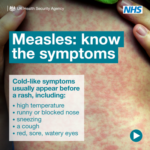 HEALTH bosses in East Sussex are urging parents and carers to check that their children are up to date with vaccinations against measles amid a surge of cases across the country.
HEALTH bosses in East Sussex are urging parents and carers to check that their children are up to date with vaccinations against measles amid a surge of cases across the country.
Figures from the UK Health Security Agency show more than 520 confirmed cases of measles in England since the beginning of the year, including one which claimed the life of child in Liverpool.
In East Sussex, more than 1 in 10 children turning five had not had the two doses of the MMR vaccination according to the latest figures from 2023-24, and 10 per cent of children turning two had not had their first dose.
Darrell Gale, Director of Public Health in East Sussex, said: “Measles is an extremely infectious virus that spreads very easily through touch, coughs and sneezes. While some people experience no symptoms, the virus can be extremely dangerous to others.
“The tragic death of a young child from measles in Liverpool highlights the importance of staying up to date with vaccinations.
“The MMR vaccine is a safe and extremely effective way to prevent measles, mumps and rubella. Two vaccines are needed to be fully protected and, while ideally children should receive the MMR vaccine at 13 months and again at three years and four months, it is never too late to catch up.”
In most people, measles can cause a high temperature, cold-like symptoms, sore watery eyes, white spots in the mouth and a rash, but complications can lead to blindness, meningitis, pneumonia and even death.
Mr Gale added: “As well as protecting yourself from measles, vaccination can reduce the risk to vulnerable people through herd immunity. To prevent the virus spreading, vaccination rates need to be around 95 per cent. The rate across England is currently at around 84 per cent.”
More information about measles, the symptoms and how people can protect themselves, is available at www.nhs.uk/conditions/measles/
Anyone experiencing symptoms should stay at home and urgently call their GP or NHS 111. To avoid passing on the infection, people should not go to their doctor’s surgery or hospital unless a healthcare professional has asked them to.
Ends.


